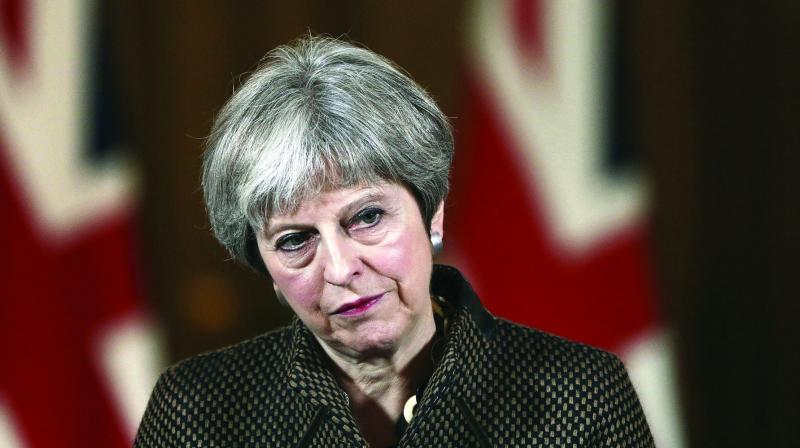British PM Theresa May suffers Brexit setback

London: Britain’s government suffered another setback on Wednesday as MPs voted to force it to announce within three sitting days what steps it will take next if its Brexit deal is rejected by parliament next week as appears likely.
The contentious amendment was passed by 308 votes in favour to 297 against, a day after MPs delivered another blow to Prime Minister Theresa May by voting to scupper a no-deal Brexit.
The doors could open to alternatives, such as a referendum.
The setback for the PM came as MPs started five days of debate on the withdrawal agreement with the EU, and the framework for future relations, ahead of the meaningful vote next Tuesday.
The government was expecting to have 21 days to come up with a “plan B” for Brexit if, as widely expected, Ms May’s deal is voted down.
But MPs backed calls for it to respond within three working Parliamentary days, a deadline likely to fall on Monday, January 21. The government lost by 11 votes, with 297 MPs siding with them and 308 against.
Former attorney general Dominic Grieve, the Conservative MP who led the rebellion, said he was acting out of a sense of a “deepening crisis” over Brexit.
He said there had been too much “can-kicking” by the government and if the PM lost next week’s vote, she would need to have “serious dialogue” with MPs about alternative options.
He said there was no need for the Prime Minister to go to Brussels to try and improve the deal.
“I would rather hope that the government has been focusing on alternatives as it has been pretty clear for three to four months that the PM’s deal is in trouble,” he added.
Fellow rebel Sarah Wollaston said she and other MPs opposed to a no-deal exit were engaged in a “guerrilla campaign” to show that it would never get the consent of Parliament.
The new Grieve amendment, now passed by MPs, means that in the event the PM loses next week, the Commons will then have a chance to vote on alternative policies - everything from a “managed no-deal” to a further referendum, via a “Norway option” or a reheated version of the current deal, could be on the table.
If a majority could be found for anything, it would not have the force of law but it would at least indicate a policy which had the support of MPs.
This is, in short, a massive ruling by the Speaker, made, apparently, against the advice of the Commons Clerk, Sir David Natzler.
Conservative Brexiteer Jacob Rees-Mogg, who favours leaving without a withdrawal agreement, said it would not stop the UK exiting on 29 March.
“It merely requires a motion to be tabled not even debated,” he said.
And prisons minister Rory Stewart, who backs the PM’s deal, said requiring Ms May to restart complex negotiations with the EU and come back with changes in three days, was “unreasonable”.
He said Mr Grieve was “trying to provide more support for what he wants, which is a second referendum”. Downing Street said it would consider the repercussions of Wednesday’s defeat but its intention had always been to “provide certainty” as soon as possible.
Labour has said it will table a motion of no confidence in the government if Ms May’s deal is voted down. Shadow Brexit Secretary Sir Keir Starmer said Parliament had to “take control of what happens next” and promised Labour would play a constructive role in the process.

